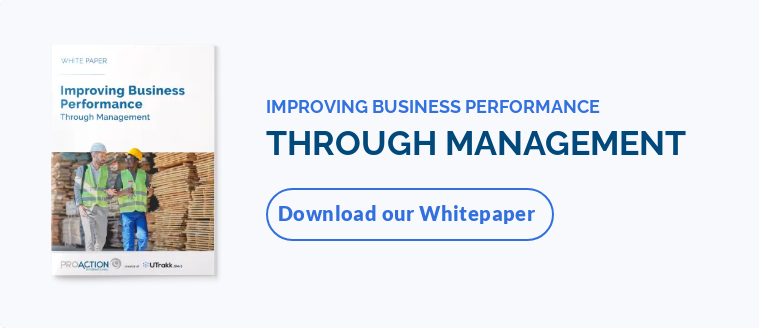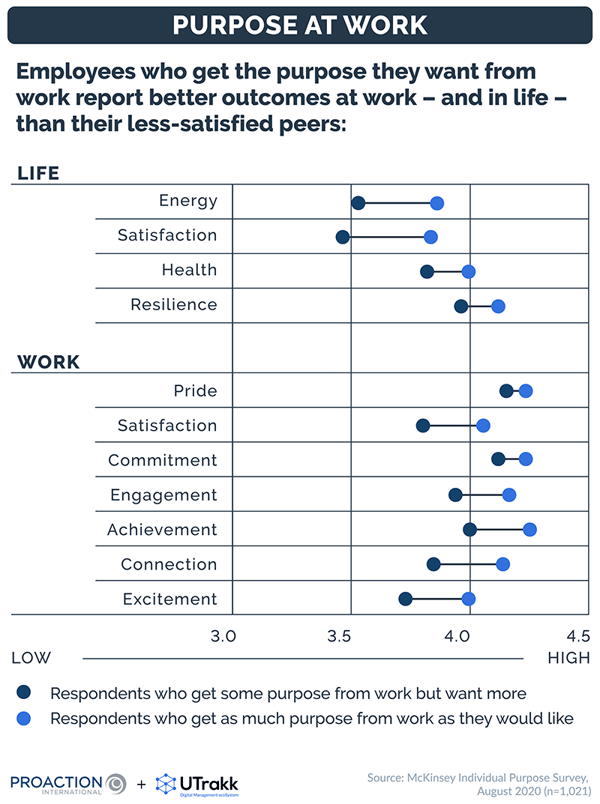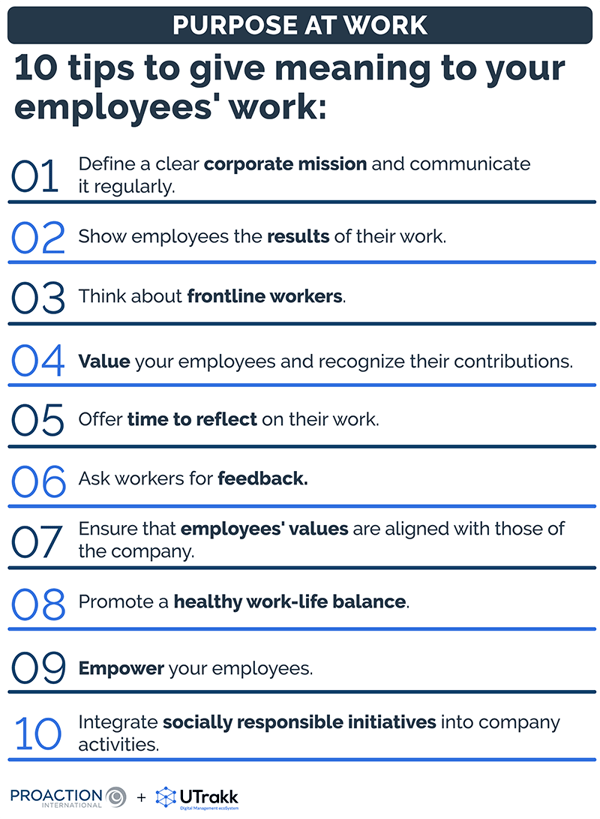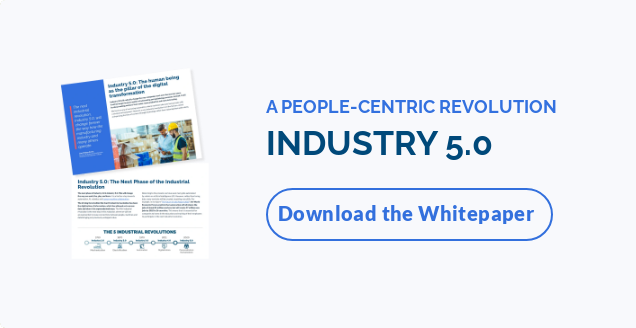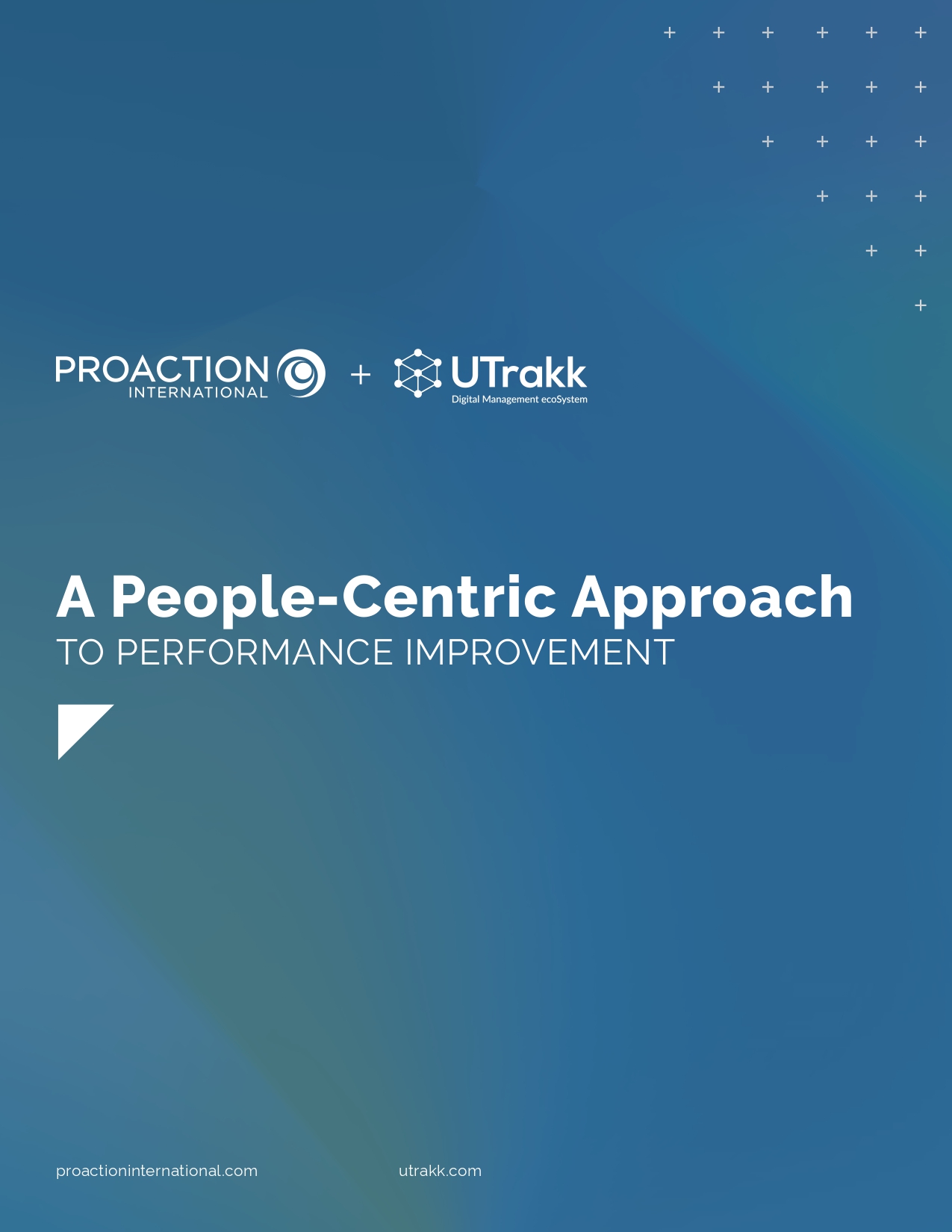Why do companies need or have to change their approach towards their employees?
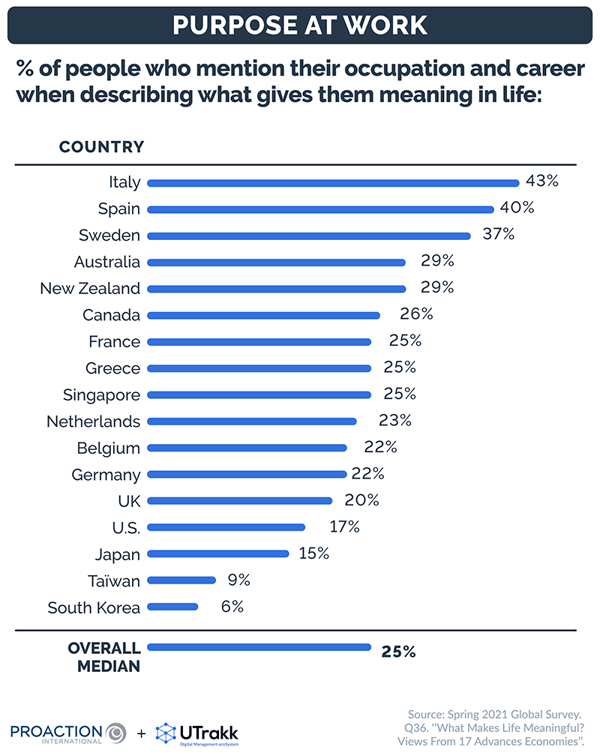
According to the Pew Research Center, work is commonly cited as one of life's primary sources of meaning. In fact, out of 17 countries surveyed, it is among the three most frequently mentioned, and therefore important, issues. In Spain, it even comes ahead of family and children.
Let's take a look at the main reasons behind this phenomenon.
Profound global changes
The last few years have been intense and full of upheavals. The pandemic, ecological alerts, economic uncertainties, and political instabilities have caused electroshock in the world. Many people have started to think about themselves, their personal values, the purpose of their existence, and how they spend their time, particularly at work.
The American consulting and research company Gartner calls this "The Human Deal" and articulates this concept around five key points necessary to give a purposeful work:
- Deeper connections
- Radical flexibility
- Personal growth
- Holistic well-being
- Shared purpose
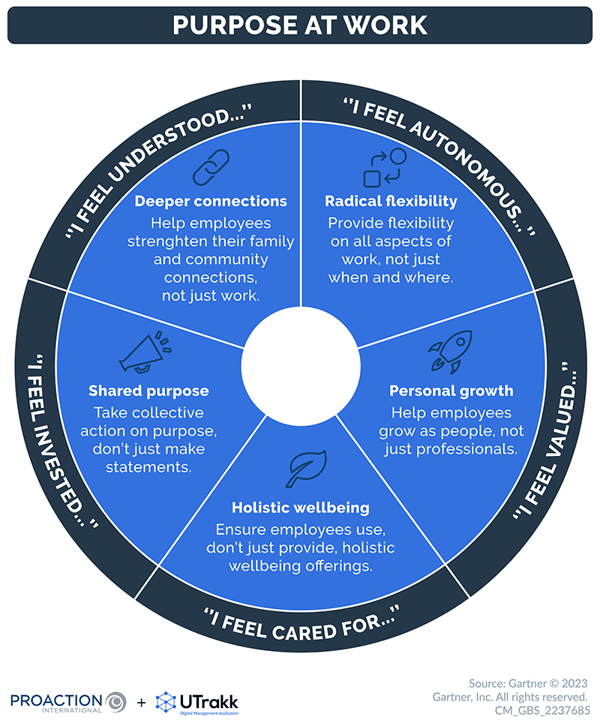
The new generations
Millennials and Generation Z don't just work for a paycheck; they want a purpose. [...] They no longer seek job satisfaction; they pursue development."
Gallup, It's the Manager
For Millennials and Generation Z, work is no longer just about security and a paycheck at the end of the month. Their quest for meaning, transparency, innovation, and ethical values has prompted many organizations to move towards more people-centric models, redefining the norms of modern corporate culture.
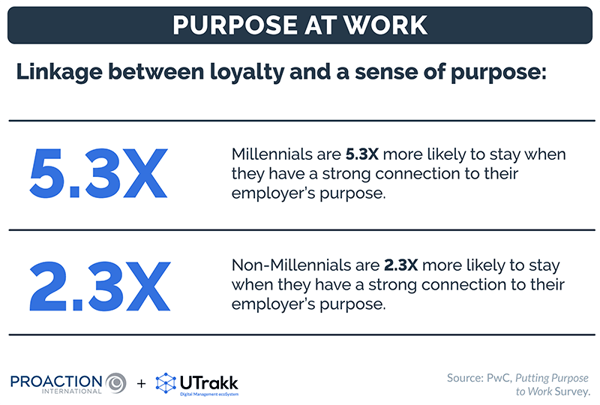
What does purpose at work mean?
People seek purpose in their lives — and that includes work. [...] The era of the employment contract, where a worker provided services purely in exchange for monetary compensation, is over. Now, employees expect deeper relationships, a strong sense of community and purpose-driven work.
Gartner study
In the professional context, the idea of "purpose" refers to the conviction that the work performed by an individual has importance, usefulness, and a dimension beyond the mere performance of tasks in exchange for remuneration. It's the person's deep-rooted feeling that their work contributes to something greater, to a meaningful goal or mission. It’s a feeling that unites personal satisfaction and professional fulfillment.
“It’s not just a job,” or how important purpose is for employees
People who live their purpose at work are more productive than people who don’t. They are also healthier, more resilient, and more likely to stay at the company. Moreover, when employees feel that their purpose is aligned with the organization’s purpose, the benefits expand to include stronger employee engagement, heightened loyalty, and a greater willingness to recommend the company to others.
McKinsey study
Giving purpose at work to improve performance
When workers perceive the deeper meaning of their contributions, their commitment and motivation intensify. They no longer see their work as a mere obligation but as an integral part of a broader mission. This sense of relevance, in turn, leads to increased productivity, encouraging employees to exceed expectations in their day-to-day responsibilities.
Employees invested in their work are often more creative, resilient in the face of challenges, and more inclined to collaborate constructively. This individual synergy contributes to an overall improvement in team and company performance.
Giving purpose at work to retain more employees
Giving more purpose to employees' work fosters their sense of accomplishment and job satisfaction, strengthening their attachment to the company. Moreover, people invested in a global mission or vision are less inclined to seek opportunities elsewhere.
By cultivating an environment where work is meaningful, organizations attract talent and retain it by creating an organizational culture where every member feels part of a common purpose.
62% of those surveyed said they had considered their organization's purpose when they joined, and 47% said they had left an organization for purpose-related reasons. Purpose seems to be particularly important for Generation Z and Millennials, who are much more likely than older generations to choose and change jobs for purpose-related reasons.
Deloitte study
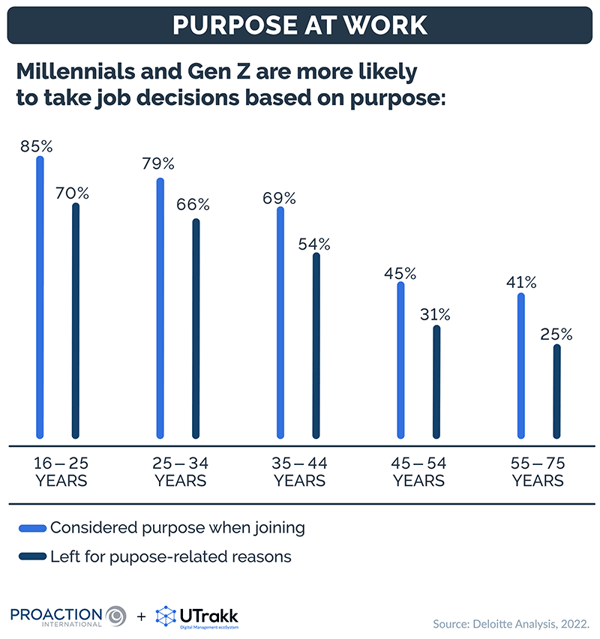
Giving purpose at work for collective well-being
When every team member finds a personal purpose in their daily tasks, this creates an environment in which collaboration and solidarity thrive.
Meaning at work fosters a positive organizational culture, where employees feel valued and connected to the same mission, where everyone can thrive and contribute to the team's success. It also helps reduce stress, prevent burn-out, and provides better health and a more fulfilling working environment in which individual and collective well-being are harmoniously intertwined.
The role of everyone in giving meaning at work
Meaning at work: the role of companies
70% of employees said that their sense of purpose is defined by their work. So, like it or not, as a company leader you play an important part in helping your employees find their purpose and live it.
McKinsey study
As a company (or business leader), you need to develop a clear, inspiring, and authentic vision that transcends mere financial profit. Your employees must be able to identify with you, your management culture and principles. They need to feel involved and in tune with your operations and mission.
Integrating ethical values and a social purpose can provide a meaningful framework for your employees' day-to-day work. Moreover, communicating this vision transparently is crucial to establishing a link between individual work and the overall organizational goal.
Find out more about inspiring companies that strive to give meaning to their employees' work in our article on purpose-driven business!
It has this huge uplift when you have a great alignment between the organization’s purpose and the individual’s purpose.
Bill Schaninger, Senior Partner at McKinsey's Philadelphia office
Meaning at work: the role of managers
Employees need to feel appreciated by their managers and see that their work makes a difference.
Great Place to Work study
As managers, you play a central role in creating an environment that gives meaning to your teams' work. You need to be inspiring leaders who reward your employees' hard work, showing them how much they contribute to the company’s purpose.
You also need to let them ask questions, express their opinions, and give ideas and perspectives. They need to be seen and heard, recognized for what they do and who they are.
Meaning at work: the role of colleagues
Positive interpersonal relationships help create a context where employees feel connected, understood, and supported. These are essential elements in giving meaning to their collective contribution.
Colleagues can inspire and motivate each other by sharing successes, challenges, and career aspirations.
In this way, the dynamic between colleagues is not simply a social aspect of the working environment. Still, it plays a central role in building a corporate culture where everyone finds meaning in their work.
10 tips to give meaning to your employees' work
1. Define a clear corporate mission and communicate it regularly
The company's mission must transcend the mere realization of financial benefits and aim at a genuine objective.
Communicating this mission regularly and transparently helps employees understand their professional purpose. They are no longer just there to carry out tasks, but contribute in their daily activities to the organizational purpose.
Don't hesitate to repeat yourself on the objectives and mission so that your teams keep them firmly in mind, and keep moving in that direction. You can also use these objectives to support the decisions you make and show workers that they have a clear purpose.
2. Show employees the results of their work
Employees rarely have the opportunity to see the fruits of their labor beyond their jobs, beyond the company itself. You need to change that to give more meaning to what they do.
You can, for example, share with them anecdotes about how the organization has brought about concrete changes in the personal lives of its customers. Show them the finished service or product, its usefulness, benefits for users, application in everyday life, customer feedback, etc. In short, show them that they are making a difference in one way or another.
3. Thinking about front-line workers
Giving meaning to work is for more than just people working in offices. Often overlooked, frontline employees are just as important. That's why getting out into the field and supporting, listening to, and motivating them is essential.
You must also show them how their work contributes to the company's success. If, for example, they work in a factory that manufactures recyclable products, they need to see their impact on the environment and their usefulness in everyday life.
Another crucial point: Frontline workers must be properly empowered and provided with the means to feel more autonomous, efficient, and helpful.
4. Value your employees and recognize their contributions
Giving meaning to the work of your team members also means making them feel important, valuing them, and not hesitating to congratulate them on a job well done. Celebrate both big and small successes.
Appreciation is precious. It reinforces the sense of accomplishment and well-being of those who receive it, motivates them to give their all, and boosts employee engagement.
5. Offer time to reflect on their work
To find meaning in what they do, your employees also need time to reflect on the work they do every day and its impact on others. It's a way of reconnecting them with the company's mission, but also with themselves and their deepest desires.
You could set aside a dedicated time during the month or week. Provide your team members with questions to answer, such as how they feel about their work, what they've achieved, what they'd like to see improved, how they relate to the company's objectives, etc.
6. Ask workers for feedback
We often talk about the feedback you need to give as managers. But it's just as crucial for your team members to be able to provide you with feedback too. Give them this space, and encourage them to do so! Regularly ask for their opinions so that they feel helpful and taken into consideration. It will reinforce their feeling that what they do matters, that they have something unique to contribute, and that the company needs them.
You can ask for feedback in the field and individual or group meetings, for example.
7. Ensure that employees' values are aligned with those of the company
For most people, working for a company whose values match their own gives meaning to their day-to-day activity, with each task contributing to a broader vision. It creates an emotional connection, reinforces the feeling of belonging to a community, of sharing common principles, and consolidates individuals' intrinsic motivation.
8. Promote a healthy work-life balance
It is fundamental to employee well-being. Companies can implement policies and initiatives that encourage a balance, enabling their workforce to reconcile their professional obligations with a fulfilling personal life.
When this need is considered, employees feel respected as individuals (not just as workers) and are more committed to their professional tasks. It contributes to a corporate culture that values diverse life paths and recognizes that personal and professional fulfillment are interdependent.
While 82% of employees say it’s important for their organization to see them as a person, not just an employee, only 45% of employees believe their organization actually sees them this way.
Gartner study
9. Empowering employees
Companies recognize employees as capable and competent individuals by offering them the freedom to make decisions related to their responsibilities. This autonomy enables them to take full ownership of their work, encouraging them to see it as a meaningful personal contribution rather than a series of tasks.
Empowering employees also means actively involving them in the company's results. It creates a direct link between their daily actions and concrete results, reinforcing the meaning of what they do.
10. Integrate socially responsible initiatives into company activities
Socially accountable companies generate a strong sense of pride among employees. They see their company as an agent of change, using its position to contribute positively to the community and society.
You can integrate responsible initiatives into corporate activities, such as philanthropic projects or sustainable practices, and setting up employee committees enables employees to contribute to projects with a positive impact on society and to perceive their work as a positive force making a difference.
One last piece of advice from Naina Dhingra, Partner at McKinsey's New York office:
I would offer two simple questions to reflect on over a month, every day. When did I feel most alive today? When did I feel most drained? I think reflecting on those two questions over a 30-day period may offer some really interesting insights about how you might feel about what’s going on at work, what’s going on in your life, and help you on a path to reflecting on what that sense of purpose might be.
How does the idea of purpose in the workplace fit in with Industry 5.0?
Whereas previous industrial revolutions focused primarily on operational efficiency and productivity, Industry 5.0 puts people at the heart of digital transformation. It's not just a technological change but also a cultural and environmental one. This evolution leads to closer collaboration between humans and machines towards a more global goal: promoting the "well-being" of individuals and the planet, as the two are closely linked.
In this context, purpose at work becomes essential to inspire and engage workers in the face of these new responsibilities. This perspective emphasizes creating a work environment that values the positive impact of technology on society and the environment while ensuring that each individual finds meaning and a role within this new era.
In this way, Industry 5.0 transcends process optimization to place individual fulfillment and meaningful contribution at the center of its evolution. Companies recognizing and nurturing this quest for meaning will be better positioned to attract, retain, and make the most of their human talent in this global systemic transformation.
Gartner's research shows that a human-centered approach, which gives individuals more control over their work and work environment, also makes them more productive. But this is forcing employers to rethink their approach. As with any fundamentally transformative strategy, this will require strategic commitment, leadership, cultural development, and wisely applied technology.
Gartner study
Integrating the idea of meaning at work into corporate culture: A significant challenge for the future of organizations
At present, only 20% of the world's employees are engaged in their work, that is, they hold great jobs in which they thrive on an ambitious mission and purpose. If that number reached 50%, workplaces everywhere would change.
Gallup, It's the Manager
Meaning at work has become an imperative for companies wishing to remain competitive in today's and tomorrow's job market. The benefits of promoting this idea are not limited to increased productivity but also extend to employee loyalty and well-being and, therefore, organizational well-being. Giving purpose builds more determined, creative, and resilient teams, ready to meet future challenges with determination and passion.
Business leaders, managers, and colleagues: we all have a crucial role in creating an environment where work is not just an obligation but also a source of personal satisfaction and a way for everyone to contribute to the company.
Giving meaning to work creates a virtuous circle where individuals are engaged, satisfied and contribute positively to the company's overall performance. It's an approach that benefits employees and the organization while fitting in naturally with the new industrial era.






